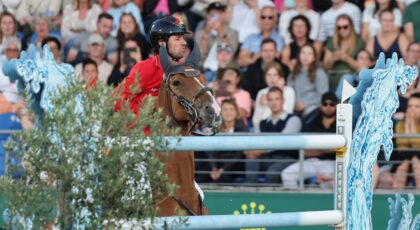Let’s have some real talk—about generalizations and why I both love and hate them.
Starting with, I love Thoroughbreds.
I think that has become very clear to everyone over the past, well, 36 years. At the age of 11, I announced that I would own one. At the age of 12, I suckered my mother into buying me one. And at the age of 36, I own a barn full.
Many can attest to what is so great about the off-the-track Thoroughbred. The heart. The athleticism. The power. The strength. I don’t think I will ever love another breed as much, nor will I have the desire to take another type over a fence.
I love that I can get on a four year old fresh off the track, and know that they’ve seen a trailer, a barn, a grooming kit, and about as many scary obstacles as possible—from goats to golf carts. I know that 99% of these horses will be just fine *for me* to swing up on without much of a fuss, and that they will walk, trot, and hand gallop without a hiccup.
I also know that they don’t know much about cross ties, mounting blocks, or someone sitting heavy in the tack. I know that I’ll have to be cautious of their first tie in the wash rack, mount off of a walk with some athleticism, and hold myself in a half seat at the canter.
I know that 33% will have a soft mouth, 33% will have a normal mouth, and 33% will have no mouth, and have the bits, the bridles, and the hands to get these all into a more cohesive number.
I know that 70% will need some podiatry work, even if it just means maintaining them in front shoes. Ninety percent if I intend to head into work without a letdown.
I also know that 95% will need guided nutrition to prevent weight loss while simultaneously encouraging weight gain. This includes GI health, high quality forage, and high fat concentrate. And might only be truly necessary for three to six months, but necessary nonetheless.
I also know, that all of this changes. And can change seemingly overnight. One cycle in pads, one round of Gastroguard, one ride in the nathe.
Some wake up, some settle down. Some process it immediately, and some take months.
Which is where the generalizations end. And the come to Jesus begins. Because each horse is its unique self.
And maybe—not everyone should own a Thoroughbred. If you, as the owner and rider, can’t manage exactly what I just listed, then you need to do your homework and develop a team. Find an equine trainer, and get better at mounting. Find a personal trainer, and develop some core strength. Find a farrier, and pay your bills. And find a support group that you trust—one that isn’t a forum on Facebook.
Moreso, find a horse that already has some of these aspects diagnosed, assessed, and fixed.
All too often, I get people who THINK they want a horse with limited retraining, when what they NEED is one confirmed at a significantly higher level. And they beg and plead for me to come let them try Fluffy or learn from Benny.
But that one ride? That one day where Benny gets his face ripped off as he goes to canter? Or that one shoeing? That one time you decide that Fluffy can transition without shoes in August? It ruins the horse. And at times, for a long time.
So please, horse shoppers around the world, ask yourselves:
1. What is my skill level? As a rider and as a horse owner.
2. Do I have assistance for the holes where I am lacking? A trainer? A farrier? A veterinarian? A nutritionist?
3. Am I fit enough to deal with the learning curve? Can I sit in half seat for two laps around the arena, or gracefully swing my weight onto a horses back?
4. Do I have access to facilities needed for these horses to thrive? Turn out? Pasture? Good hay and quality feed?
5. Do I want the journey, or do I want the ribbons. Am I in for the learning curve? Or in for the accolades?
And then answer these questions before reaching out to a seller. I don’t know you, and therefore can offer limited guidance. I think the Thoroughbred may be for everyone, but a transitioned Thoroughbred and perhaps not a fresh off the track. But I do know my horses and only want what’s best for them.
And what’s best for them isn’t always what you think you want.
This article was originally posted on Carleigh Fedorka’s Facebook page and is reprinted here with permission.


 April 15, 2022
April 15, 2022 

























